牛津译林版(2019)必修 第二册Unit 3 Festivals and customs Integrated skills 课件(共44张PPT)
文档属性
| 名称 | 牛津译林版(2019)必修 第二册Unit 3 Festivals and customs Integrated skills 课件(共44张PPT) | 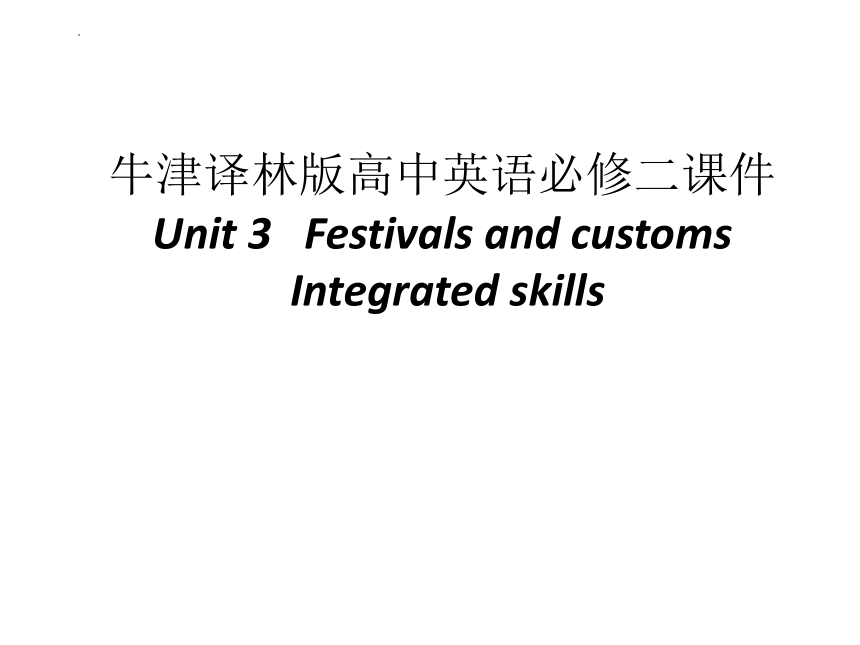 | |
| 格式 | pptx | ||
| 文件大小 | 411.1KB | ||
| 资源类型 | 教案 | ||
| 版本资源 | 牛津译林版(2019) | ||
| 科目 | 英语 | ||
| 更新时间 | 2023-07-31 14:45:12 | ||
图片预览

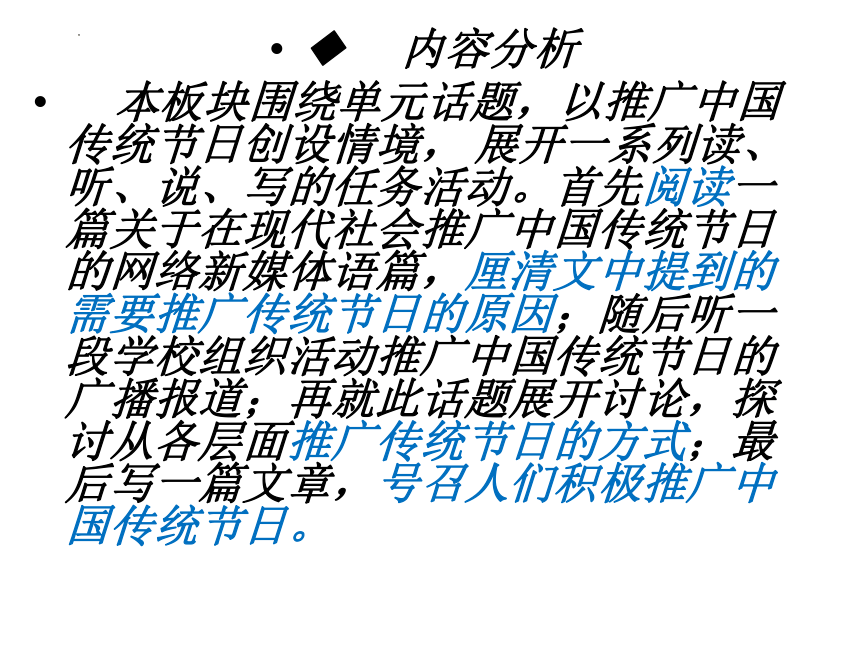
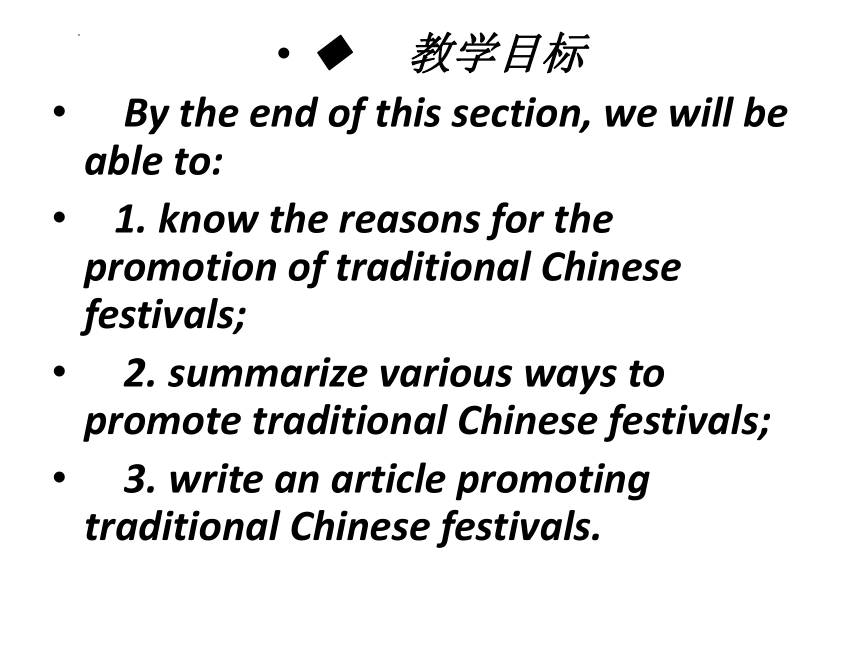
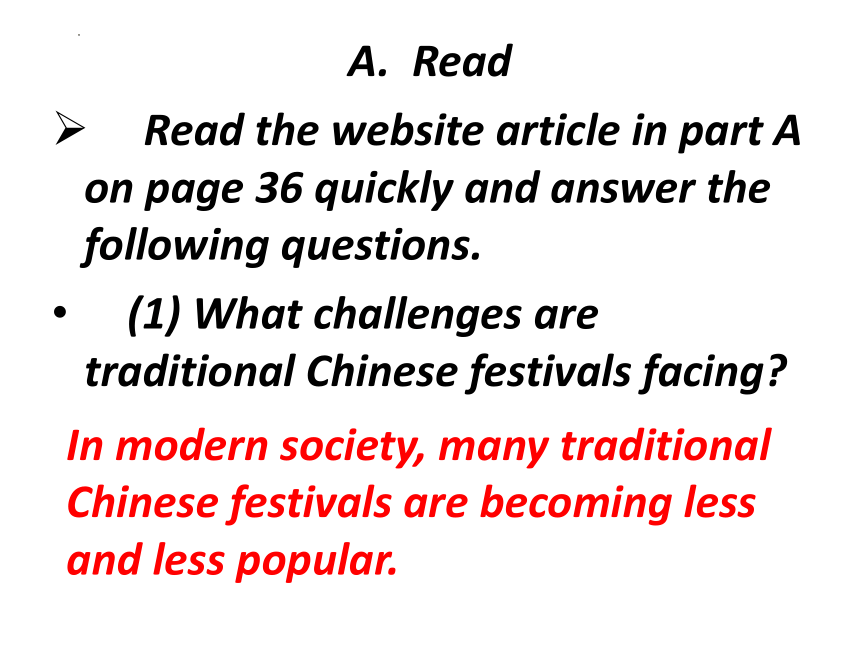
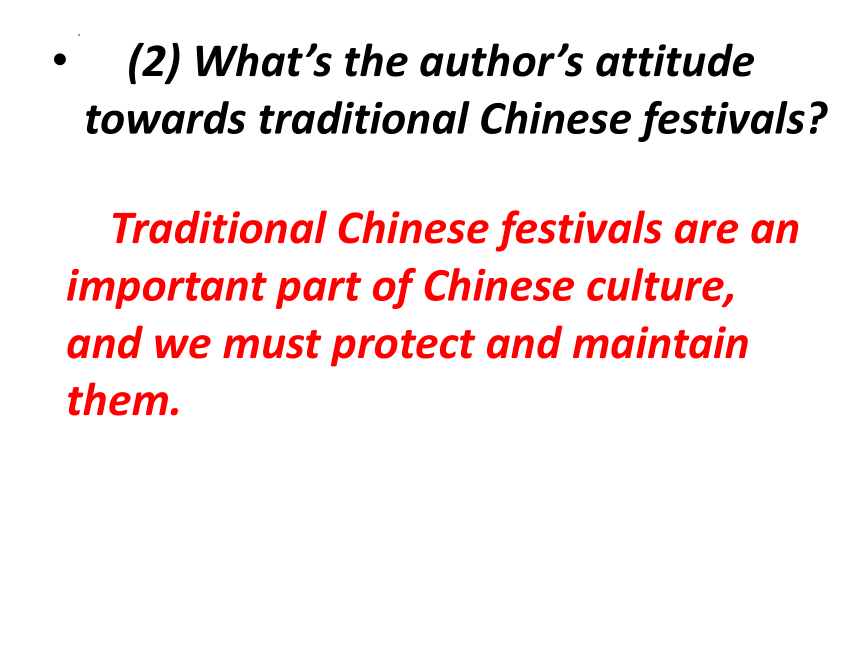
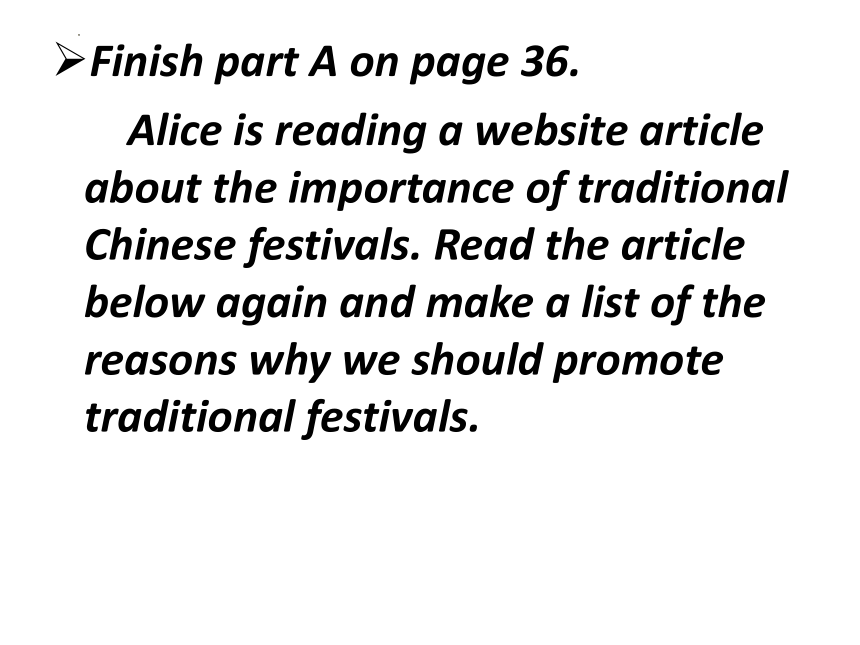
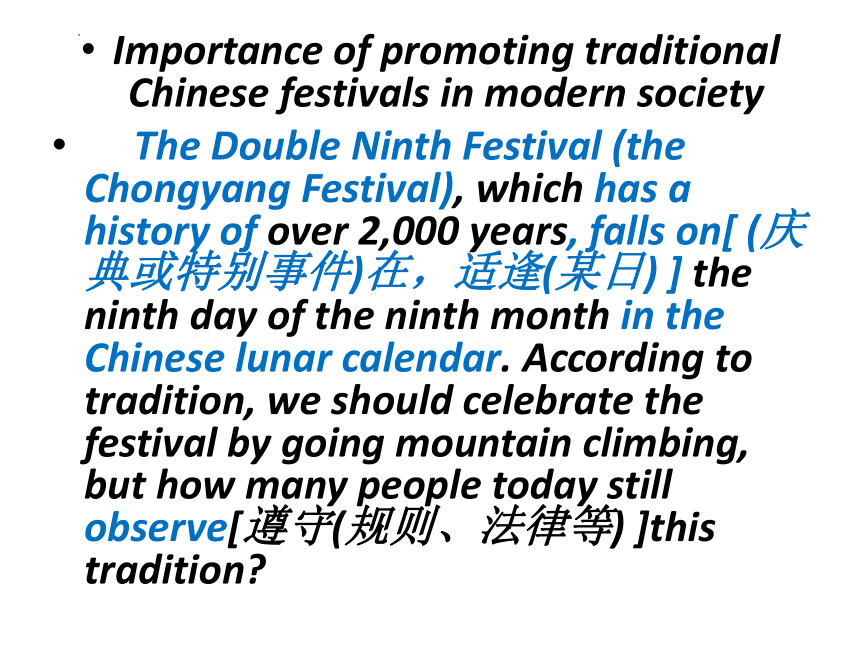
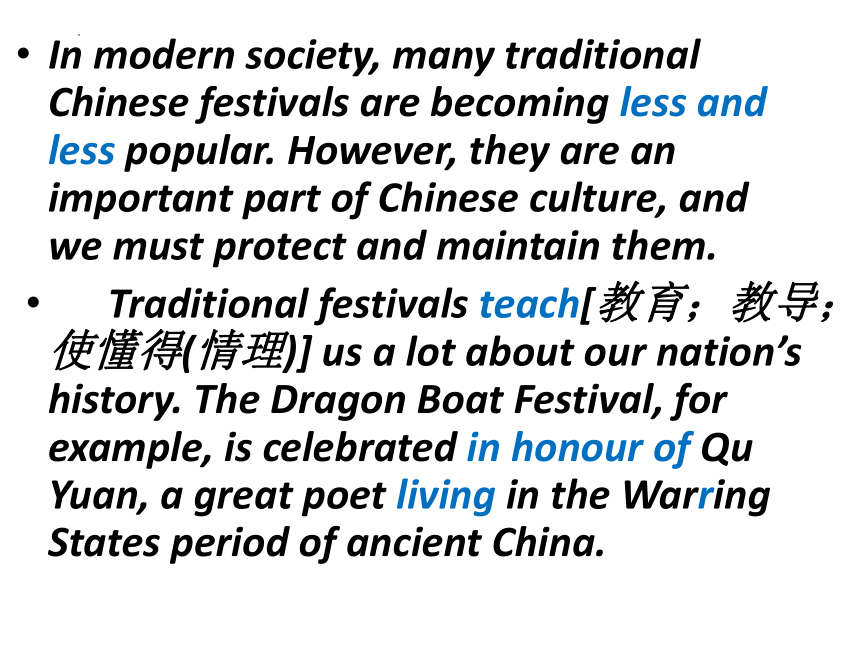
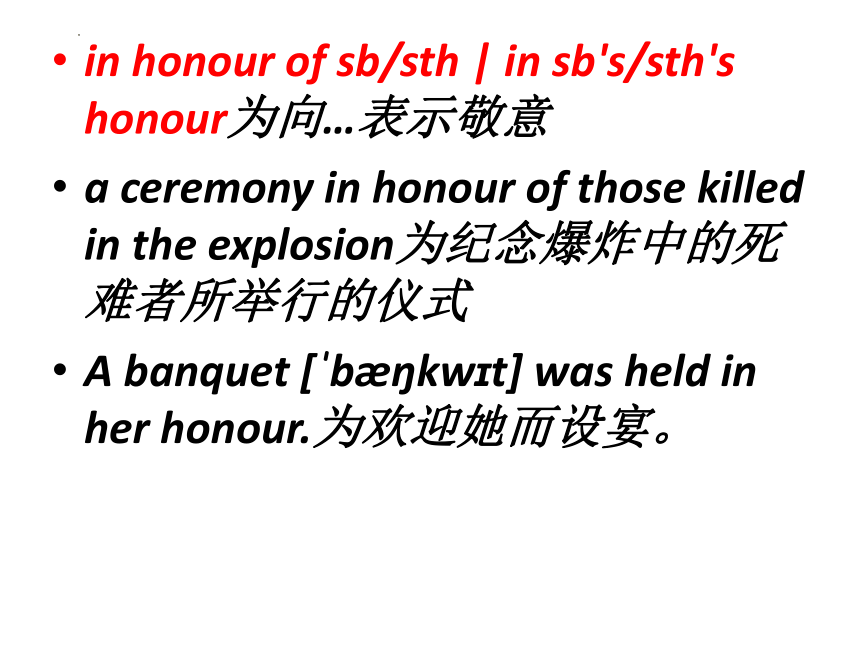
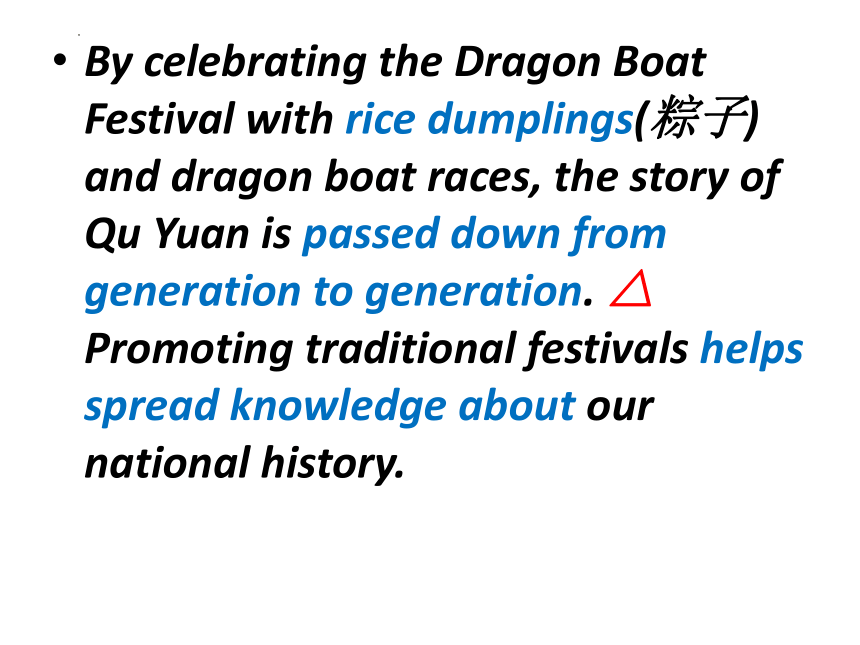
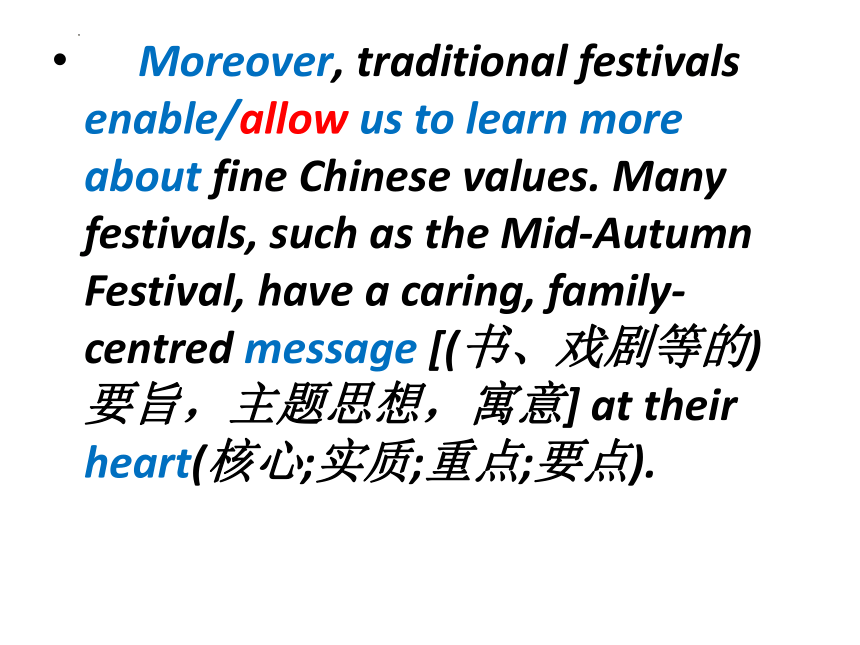
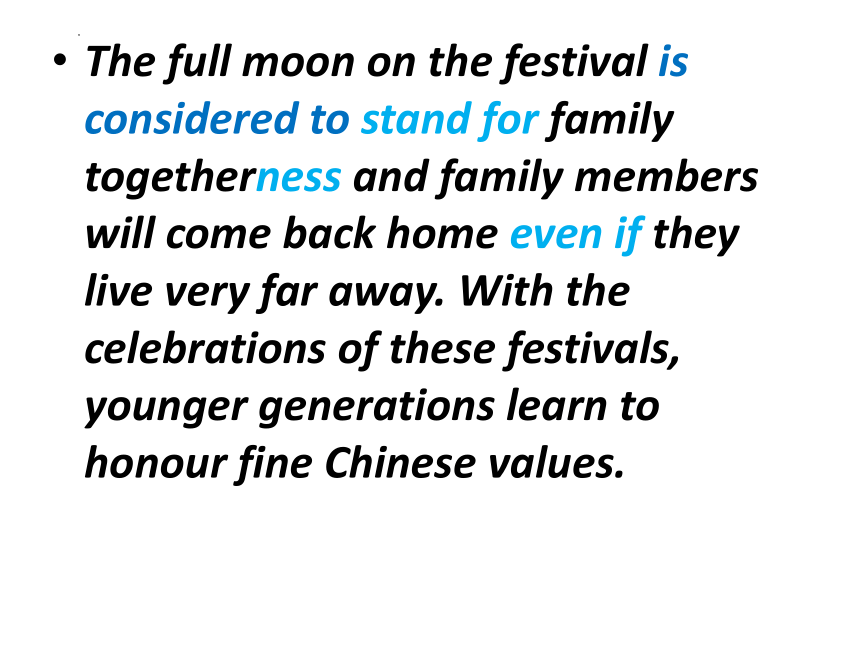
文档简介
(共44张PPT)
牛津译林版高中英语必修二课件
Unit 3 Festivals and customs
Integrated skills
◆ 内容分析
本板块围绕单元话题,以推广中国传统节日创设情境, 展开一系列读、听、说、写的任务活动。首先阅读一篇关于在现代社会推广中国传统节日的网络新媒体语篇,厘清文中提到的需要推广传统节日的原因;随后听一段学校组织活动推广中国传统节日的广播报道;再就此话题展开讨论,探讨从各层面推广传统节日的方式;最后写一篇文章,号召人们积极推广中国传统节日。
◆ 教学目标
By the end of this section, we will be able to:
1. know the reasons for the promotion of traditional Chinese festivals;
2. summarize various ways to promote traditional Chinese festivals;
3. write an article promoting traditional Chinese festivals.
A. Read
Read the website article in part A on page 36 quickly and answer the following questions.
(1) What challenges are traditional Chinese festivals facing
In modern society, many traditional Chinese festivals are becoming less and less popular.
(2) What’s the author’s attitude towards traditional Chinese festivals
Traditional Chinese festivals are an important part of Chinese culture, and we must protect and maintain them.
Finish part A on page 36.
Alice is reading a website article about the importance of traditional Chinese festivals. Read the article below again and make a list of the reasons why we should promote traditional festivals.
Importance of promoting traditional Chinese festivals in modern society
The Double Ninth Festival (the Chongyang Festival), which has a history of over 2,000 years, falls on[ (庆典或特别事件)在,适逢(某日) ] the ninth day of the ninth month in the Chinese lunar calendar. According to tradition, we should celebrate the festival by going mountain climbing, but how many people today still observe[遵守(规则、法律等) ]this tradition
In modern society, many traditional Chinese festivals are becoming less and less popular. However, they are an important part of Chinese culture, and we must protect and maintain them.
Traditional festivals teach[教育;教导;使懂得(情理)] us a lot about our nation’s history. The Dragon Boat Festival, for example, is celebrated in honour of Qu Yuan, a great poet living in the Warring States period of ancient China.
in honour of sb/sth | in sb's/sth's honour为向…表示敬意
a ceremony in honour of those killed in the explosion为纪念爆炸中的死难者所举行的仪式
A banquet [ b kw t] was held in her honour.为欢迎她而设宴。
By celebrating the Dragon Boat Festival with rice dumplings(粽子) and dragon boat races, the story of Qu Yuan is passed down from generation to generation. △ Promoting traditional festivals helps spread knowledge about our national history.
Moreover, traditional festivals enable/allow us to learn more about fine Chinese values. Many festivals, such as the Mid-Autumn Festival, have a caring, family-centred message [(书、戏剧等的)要旨,主题思想,寓意] at their heart(核心;实质;重点;要点).
The full moon on the festival is considered to stand for family togetherness and family members will come back home even if they live very far away. With the celebrations of these festivals, younger generations learn to honour fine Chinese values.
Finally, traditional festivals are a source of national pride and help shape our national identity. For example, we celebrate the Hanshi Festival and the Laba Festival with unique customs, and these shared experiences bring us together as a people. Traditional festivals tell us who we are and fill us with pride in being Chinese.
Traditional festivals have been passed down to us from previous generations. It is the duty of every one of us to protect them for generations to come.
to come (用于名词后) 将来;未来的
They may well regret the decision in years to come .他们很可能会在以后的年月里为这个决定而后悔。
This will be a problem for some time to come .
这将是未来一段时期里的一个问题。
Reasons why we should promote traditional Chinese festivals:
1. Traditional festivals teach us about Chinese history.
2. Traditional festivals enable us to learn more about fine Chinese values.
3. Traditional festivals are a source of national pride and help shape our national identity.
B. Listen
B. Alice is listening to a school radio report about what her school has done to promote traditional Chinese festivals. Listen and finish the exercises below.
Finish B1 on page 37.
Listen to the report and answer the following questions.
1. When did the course Traditional Chinese Festivals start
2. Who was the winner of the poster design competition
Last term.
The Art Club.
3. How many students took part in the poetry writing competition
4. How long did the play about the Qingming Festival last
More than 100.
About 30 minutes.
Finish B2 on page 37.
Listen to the report again and complete the table below.
200
a full moon
the Double Ninth Festival
a full moon
the Double Ninth Festival
The Theatre Club
rice dumplings
Tapescript
School reporter: Over the past year, our school has successfully organized a number of activities to promote traditional Chinese festivals.
An optional course called Traditional Chinese Festivals started last term. It has proved very popular so far. The number of students who have signed up for[报名(参加课程)] the course has increased from 50 to 200.
Many students say that they have become more interested in traditional festivals and wish to learn more about them.
In addition to the course, several competitions have been held to promote traditional festivals. The most recent one was the competition to design a poster about traditional festivals.
The winning design was created by the Art Club, about the Mid-Autumn Festival. Their poster showed a full moon with the beautiful figure of Chang’e on it. We also had a poetry writing competition. More than 100 students took part and wrote wonderful poems about traditional festivals.
The winner was Joseph [ d uzif] Lin from Class 3C. He wrote a poem about his experience with his grandpa on the Double Ninth Festival.
School clubs have also played an important role in promoting traditional Chinese festivals. Just last week, the Theatre Club put on a play about the Qingming Festival in the school hall.
The play lasted about 30 minutes and was a great success. On the Dragon Boat Festival, the Cooking Club taught students how to make rice dumplings. Many students said their handmade rice dumplings were the most delicious they had ever eaten!
C. Speak
Discuss the topic “how to promote traditional Chinese festivals” by adding more information to the mind map below. Use the following questions and expressions to help you.
Why should we promote traditional Chinese festivals
How can we promote traditional Chinese festivals (The government, the media,schools, individuals, ...)
Expressions:
Talking people into action说服某人做 某事
There are clearly many ways to promote … such as …
… should promote/ encourage/ support … by …
… is surely a good/an effective way to promote …
… is very popular with …
… is important for … because …
Possible answer
A: Why should we promote traditional Chinese festivals What’s your opinion
B: I think promoting traditional festivals is important for keeping our culture and history alive. When we celebrate them, we pass down knowledge about traditions to the next generation. So if they’re not celebrated, all will be forgotten and lost forever!
A: That’s true. Traditional festivals are also a reminder(引起回忆的事物;提醒人的事物) of what it means to be Chinese. Our values and pride are found at the heart of these festivals. I believe the government should support all the traditional Chinese festivals by making them public holidays.
B: It’s surely a good way to promote national unity and pride. Meanwhile, as most people have access to different types of media, it’s an effective way to spread information through TV, radio and the Internet about ongoing (持续存在的;仍在进行的;不断发展的) activities locally,nationally and even internationally!
A: Yes, indeed! And in schools, festivals should be promoted with activities that draw attention to the historical importance of their symbols. For example,during the Lantern Festival, lantern-making competitions can be held to raise students’ awareness of the festival’s origin and history.
B: Great idea! The joint efforts will make sure our cultural traditions, symbols and history are carried forward many years into the future!
共同努力将确保我们的文化传统、象征和历史在未来的许多年里得到发扬光大!
D. Write
D. Write an article promoting traditional Chinese festivals. Use your ideas from part C and the information in parts A and B to help you.
1.Go through “Planning your writing” in part D on page 38, making sure that we know how to write an article calling for action in terms of the structure and language.
Planning your writing
Learning about the structure
When writing an article to promote traditional Chinese festivals, you can follow the structure below:
State the importance of traditional Chinese festivals.
Offer ways to promote traditional Chinese festivals.
Make a call for action and describe a positive result you would like to see.
Learning about the language
Organize your points with first of all, moreover, finally/last but not least, etc. if you give more than one way to promote traditional Chinese festivals.
Use imperative[ m per t v] sentences(祈使句)to call for action. Make them short and powerful.
Checking your writing
Remember to check your writing after you finish and exchange drafts between you and your partner. Pay attention to the following aspects:
2. Finish the article individually.
3. Check the writing and exchange drafts with your partners for peer review.
Possible answer
Promoting traditional Chinese festivals
Traditional Chinese festivals are an important part of Chinese culture. We must protect and promote these festivals so that our children can understand what it means to be Chinese.
Traditional festivals teach us about our country’s history.
Rich humanistic [ hju:m 'n st k](人文主义的) spirits can be found at the heart of traditional festivals, a result of Chinese values of kindness and unity being passed down from generation to generation. By observing traditional festivals, we will have a better understanding of the historical importance of these qualities in our country. We can therefore develop our national pride.
Many parties have important roles to play in promoting traditional Chinese festivals. The government should declare public holidays on some traditional festivals. The media can help spread more knowledge about these traditions so as to raise people’s interest in the origins and history of the festivals.
Schools can also hold more activities which help draw students’ attention to our traditions.
With the joint efforts of these different parties, people will pay more attention to traditional Chinese festivals, and be prouder of Chinese culture.
牛津译林版高中英语必修二课件
Unit 3 Festivals and customs
Integrated skills
◆ 内容分析
本板块围绕单元话题,以推广中国传统节日创设情境, 展开一系列读、听、说、写的任务活动。首先阅读一篇关于在现代社会推广中国传统节日的网络新媒体语篇,厘清文中提到的需要推广传统节日的原因;随后听一段学校组织活动推广中国传统节日的广播报道;再就此话题展开讨论,探讨从各层面推广传统节日的方式;最后写一篇文章,号召人们积极推广中国传统节日。
◆ 教学目标
By the end of this section, we will be able to:
1. know the reasons for the promotion of traditional Chinese festivals;
2. summarize various ways to promote traditional Chinese festivals;
3. write an article promoting traditional Chinese festivals.
A. Read
Read the website article in part A on page 36 quickly and answer the following questions.
(1) What challenges are traditional Chinese festivals facing
In modern society, many traditional Chinese festivals are becoming less and less popular.
(2) What’s the author’s attitude towards traditional Chinese festivals
Traditional Chinese festivals are an important part of Chinese culture, and we must protect and maintain them.
Finish part A on page 36.
Alice is reading a website article about the importance of traditional Chinese festivals. Read the article below again and make a list of the reasons why we should promote traditional festivals.
Importance of promoting traditional Chinese festivals in modern society
The Double Ninth Festival (the Chongyang Festival), which has a history of over 2,000 years, falls on[ (庆典或特别事件)在,适逢(某日) ] the ninth day of the ninth month in the Chinese lunar calendar. According to tradition, we should celebrate the festival by going mountain climbing, but how many people today still observe[遵守(规则、法律等) ]this tradition
In modern society, many traditional Chinese festivals are becoming less and less popular. However, they are an important part of Chinese culture, and we must protect and maintain them.
Traditional festivals teach[教育;教导;使懂得(情理)] us a lot about our nation’s history. The Dragon Boat Festival, for example, is celebrated in honour of Qu Yuan, a great poet living in the Warring States period of ancient China.
in honour of sb/sth | in sb's/sth's honour为向…表示敬意
a ceremony in honour of those killed in the explosion为纪念爆炸中的死难者所举行的仪式
A banquet [ b kw t] was held in her honour.为欢迎她而设宴。
By celebrating the Dragon Boat Festival with rice dumplings(粽子) and dragon boat races, the story of Qu Yuan is passed down from generation to generation. △ Promoting traditional festivals helps spread knowledge about our national history.
Moreover, traditional festivals enable/allow us to learn more about fine Chinese values. Many festivals, such as the Mid-Autumn Festival, have a caring, family-centred message [(书、戏剧等的)要旨,主题思想,寓意] at their heart(核心;实质;重点;要点).
The full moon on the festival is considered to stand for family togetherness and family members will come back home even if they live very far away. With the celebrations of these festivals, younger generations learn to honour fine Chinese values.
Finally, traditional festivals are a source of national pride and help shape our national identity. For example, we celebrate the Hanshi Festival and the Laba Festival with unique customs, and these shared experiences bring us together as a people. Traditional festivals tell us who we are and fill us with pride in being Chinese.
Traditional festivals have been passed down to us from previous generations. It is the duty of every one of us to protect them for generations to come.
to come (用于名词后) 将来;未来的
They may well regret the decision in years to come .他们很可能会在以后的年月里为这个决定而后悔。
This will be a problem for some time to come .
这将是未来一段时期里的一个问题。
Reasons why we should promote traditional Chinese festivals:
1. Traditional festivals teach us about Chinese history.
2. Traditional festivals enable us to learn more about fine Chinese values.
3. Traditional festivals are a source of national pride and help shape our national identity.
B. Listen
B. Alice is listening to a school radio report about what her school has done to promote traditional Chinese festivals. Listen and finish the exercises below.
Finish B1 on page 37.
Listen to the report and answer the following questions.
1. When did the course Traditional Chinese Festivals start
2. Who was the winner of the poster design competition
Last term.
The Art Club.
3. How many students took part in the poetry writing competition
4. How long did the play about the Qingming Festival last
More than 100.
About 30 minutes.
Finish B2 on page 37.
Listen to the report again and complete the table below.
200
a full moon
the Double Ninth Festival
a full moon
the Double Ninth Festival
The Theatre Club
rice dumplings
Tapescript
School reporter: Over the past year, our school has successfully organized a number of activities to promote traditional Chinese festivals.
An optional course called Traditional Chinese Festivals started last term. It has proved very popular so far. The number of students who have signed up for[报名(参加课程)] the course has increased from 50 to 200.
Many students say that they have become more interested in traditional festivals and wish to learn more about them.
In addition to the course, several competitions have been held to promote traditional festivals. The most recent one was the competition to design a poster about traditional festivals.
The winning design was created by the Art Club, about the Mid-Autumn Festival. Their poster showed a full moon with the beautiful figure of Chang’e on it. We also had a poetry writing competition. More than 100 students took part and wrote wonderful poems about traditional festivals.
The winner was Joseph [ d uzif] Lin from Class 3C. He wrote a poem about his experience with his grandpa on the Double Ninth Festival.
School clubs have also played an important role in promoting traditional Chinese festivals. Just last week, the Theatre Club put on a play about the Qingming Festival in the school hall.
The play lasted about 30 minutes and was a great success. On the Dragon Boat Festival, the Cooking Club taught students how to make rice dumplings. Many students said their handmade rice dumplings were the most delicious they had ever eaten!
C. Speak
Discuss the topic “how to promote traditional Chinese festivals” by adding more information to the mind map below. Use the following questions and expressions to help you.
Why should we promote traditional Chinese festivals
How can we promote traditional Chinese festivals (The government, the media,schools, individuals, ...)
Expressions:
Talking people into action说服某人做 某事
There are clearly many ways to promote … such as …
… should promote/ encourage/ support … by …
… is surely a good/an effective way to promote …
… is very popular with …
… is important for … because …
Possible answer
A: Why should we promote traditional Chinese festivals What’s your opinion
B: I think promoting traditional festivals is important for keeping our culture and history alive. When we celebrate them, we pass down knowledge about traditions to the next generation. So if they’re not celebrated, all will be forgotten and lost forever!
A: That’s true. Traditional festivals are also a reminder(引起回忆的事物;提醒人的事物) of what it means to be Chinese. Our values and pride are found at the heart of these festivals. I believe the government should support all the traditional Chinese festivals by making them public holidays.
B: It’s surely a good way to promote national unity and pride. Meanwhile, as most people have access to different types of media, it’s an effective way to spread information through TV, radio and the Internet about ongoing (持续存在的;仍在进行的;不断发展的) activities locally,nationally and even internationally!
A: Yes, indeed! And in schools, festivals should be promoted with activities that draw attention to the historical importance of their symbols. For example,during the Lantern Festival, lantern-making competitions can be held to raise students’ awareness of the festival’s origin and history.
B: Great idea! The joint efforts will make sure our cultural traditions, symbols and history are carried forward many years into the future!
共同努力将确保我们的文化传统、象征和历史在未来的许多年里得到发扬光大!
D. Write
D. Write an article promoting traditional Chinese festivals. Use your ideas from part C and the information in parts A and B to help you.
1.Go through “Planning your writing” in part D on page 38, making sure that we know how to write an article calling for action in terms of the structure and language.
Planning your writing
Learning about the structure
When writing an article to promote traditional Chinese festivals, you can follow the structure below:
State the importance of traditional Chinese festivals.
Offer ways to promote traditional Chinese festivals.
Make a call for action and describe a positive result you would like to see.
Learning about the language
Organize your points with first of all, moreover, finally/last but not least, etc. if you give more than one way to promote traditional Chinese festivals.
Use imperative[ m per t v] sentences(祈使句)to call for action. Make them short and powerful.
Checking your writing
Remember to check your writing after you finish and exchange drafts between you and your partner. Pay attention to the following aspects:
2. Finish the article individually.
3. Check the writing and exchange drafts with your partners for peer review.
Possible answer
Promoting traditional Chinese festivals
Traditional Chinese festivals are an important part of Chinese culture. We must protect and promote these festivals so that our children can understand what it means to be Chinese.
Traditional festivals teach us about our country’s history.
Rich humanistic [ hju:m 'n st k](人文主义的) spirits can be found at the heart of traditional festivals, a result of Chinese values of kindness and unity being passed down from generation to generation. By observing traditional festivals, we will have a better understanding of the historical importance of these qualities in our country. We can therefore develop our national pride.
Many parties have important roles to play in promoting traditional Chinese festivals. The government should declare public holidays on some traditional festivals. The media can help spread more knowledge about these traditions so as to raise people’s interest in the origins and history of the festivals.
Schools can also hold more activities which help draw students’ attention to our traditions.
With the joint efforts of these different parties, people will pay more attention to traditional Chinese festivals, and be prouder of Chinese culture.
